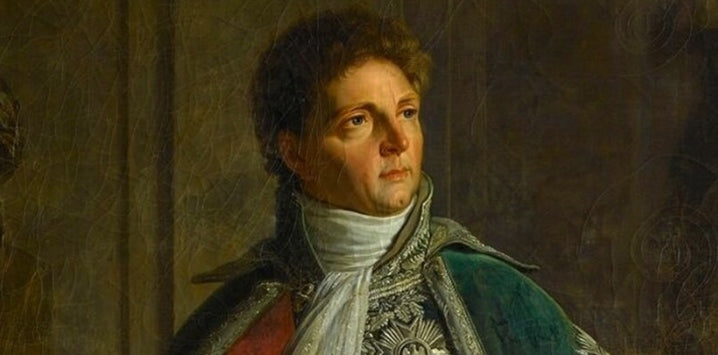Part six of our series features Louis-Alexandre Berthier, Napoleon's chief of staff who was responsible for translating Napoleon's ambitious strategic and tactical ideas into orders for subordinate commanders.
Louis-Alexandre Berthier (1753-1815), Prince of Wagram, Sovereign Prince of Neuchâtel
Marshal Louis-Alexandre Berthier is unlikely to be the first name to come to mind when considering the greatest generals of the Napoleonic era. He is not usually among the most prominent of Napoleon's marshals and rarely held independent command. Nevertheless, as Napoleon's Chief of Staff, Berthier was more than any other man responsible for the successes Napoleon enjoyed on the battlefield.
Born in 1753 at Versailles to a military family, Berthier joined the army at the age of 17, and served in America under General Rochambeau in the early 1780s. In 1796, after serving the Revolutionary Army in a number of capacities, Berthier was appointed Chief of Staff to the Army of Italy, then commanded by the 27-year-old Napoleon Bonaparte. Thus began a fruitful working relationship which spanned eighteen years. Berthier understood Napoleon better than anyone else and diligently translated his ambitious plans into practical orders and instructions for the army. The two men were so close that the soldiers referred to Berthier as "Napoleon's wife," and their close working relationship allowed Napoleon to effectively communicate his orders to his subordinates.
Soon after the end of Napoleon's First Italian Campaign, Berthier was sent to command a field army against the Papal States, arresting the octogenarian Pope Pius VI and sending him into French captivity. Berthier then rejoined Napoleon as chief of staff in the Egyptian campaign, before returning to France with him and assisting in the coup of 18 Brumaire, which saw Napoleon take power as First Consul of the Republic.
After crowning himself Emperor of the French in 1804, Napoleon reinstated the rank of Marshal of the Empire and appointed eighteen men to the position. The first name on that list was Berthier, reflecting Napoleon's dependence on his chief of staff. Berthier continued to serve in this capacity during the Napoleon's campaigns against Austria, Prussia and Russia in 1805-07, his organisational skills making no small contribution to some of Napoleon's greatest victories at Austerlitz, Jena, and Friedland. In all these campaigns the French army enjoyed a significant organisational advantage compared to its enemies, which allowed Napoleon to outmaneouvre his enemies and achieve success on the battlefield. The Austrian, Prussian, and Russian armies would learn from Napoleon and Berthier's system and strengthen their staff capabilities.
It was at Tilsit in 1807 that Berthier made one of the most egregious mistakes in his entire career. Asked by Napoleon to organise a celebratory hunt following the signing of the Treaty of Tilsit with Russia, Berthier procured 3000 tame rabbits from local farmers. When the rabbits were released from their cases to start the hunt, they ran towards Napoleon and his marshals rather than away. Before long the Emperor of the French and his generals were swamped by bunnies, and Napoleon decided to make a run for his imperial coach. Outflanked by the bunnies who had executed a double envelopment, Napoleon managed to get into his coach and drive away, throwing rabbits out of the windows as he went.
In late 1808 while campaigning in Spain, Napoleon tasked Berthier with organising the Army of the Rhine to prepare for a resumption of hostilities with Austria the following year. Berthier was obliged to take command himself when the Austrians surprised the French by attacking in the spring, and Berthier made a series of mistakes while in independent command. Napoleon's arrival stabilised the situation and although he suffered a setback at the Battle of Aspern-Essling in May while attempting to cross the Danube, the French duly secured a closely contested but decisive victory at the Battle of Wagram in July 1809. In recognition of his efforts during the campaign, Berthier was given the title Prince of Wagram.
In 1812, Berthier helped Napoleon organise his largest invasion force yet, directed against the Russian Empire, but had repeatedly warned the Emperor against overextending his lines of operation. Near the end of the calamitous campaign, when Napoleon decided to return to France, he ordered Berthier to remain with the remnants of the Grande Armée as it staggered westwards, pursued by the Russians. Berthier returned to serve as chief of staff in the 1813-14 campaigns, but despite Napoleon fighting a brilliant campaign in 1814, the Sixth Coalition armies were too plentiful, leading to Napoleon's defeat and abdication.
In 1815, Berthier initially remained loyal to King Louis XVIII and was struck off the list of marshals by Napoleon, who had established himself in Paris once again. Meanwhile Berthier's loyalty was doubted by the Bourbons, and he had nothing better than to do than to go to live at his in-laws house in Bamberg. On 1 June 1815, Berthier fell out of his window to his death. The circumstances of his death remain unclear. It may have been an accident, or suicide. Others claim he was murdered by Bourbon agents who did not want to see him join Napoleon. It was a sad end to Napoleon's most indispensable general. A fortnight later, Napoleon was defeated at Waterloo. He lamented that Berthier was not at his side, else he would have gained victory that day.
We don't have any Berthier designs in our store right now, but please check out our collection inspired by Napoleon and his Grande Armée.



Share and get 15% off!
Simply share this product on one of the following social networks and you will unlock 15% off!